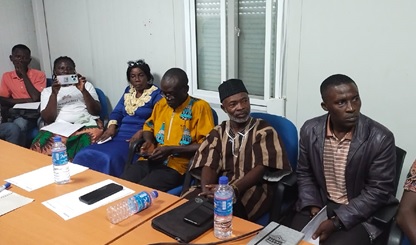MONROVIA – The resignation of Liberia Revenue Authority (LRA) Commissioner General Dorbor Jallah remains unconfirmed as he continues his official duties. In a statement to reporters, Jallah emphasized his commitment to the LRA’s mission, stating, “I’ve not resigned. I’m still the Commissioner General. We’re working to expand the revenue envelope of Liberia.” His remarks followed his ongoing meetings with key international financial bodies, including the European Union (EU) and the International Monetary Fund (IMF), held at the Liberia Revenue Authority.
The report of Jallah’s potential resignation comes amidst mounting threats by former Commerce Minister Amin Modad, who has vowed to expose others involved in the MedTech-sponsored luxury vehicle purchase scandal. Sources suggest that Jallah’s resignation could be triggered by discontentment within international circles over his long-professed integrity, now called into question due to the Modad vehicle saga. Given the gravity of the matter, the Liberian Senate is expected to hold a committee hearing to investigate why the LRA approved US$96,000 for the vehicle purchase for Modad, who himself resigned from office just days ago. The General Services Agency (GSA) has since taken possession of the luxury vehicle.
In recent weeks, Jallah has come under intense public scrutiny following accusations that he facilitated questionable financial decisions, most notably approving funds for the purchase of the vehicle for Modad. The controversy has triggered widespread criticism, with various public figures and activists demanding accountability.
The controversy was fueled by Mr. Isaac W. Jackson, Jr., Liberia’s former Permanent Representative to the International Maritime Organization, who called for Jallah’s resignation on October 11, 2024. In a strongly worded statement titled “For the Integrity of the LRA, the Enabler-In-Chief Must RESIGN,” Jackson accused Jallah of enabling misconduct. Specifically, Jackson criticized Jallah for authorizing the payment in May 2024 without proper due diligence.
“Mr. Dorbor Jallah, Head of LRA, dished out US$96,000 to Amin Modad! When this matter became public, Mr. Jallah doubled down by providing a plausible justification for Modad’s egregious conduct,” Jackson charged. He further alleged that Jallah’s actions were influenced by tribal bias, in violation of Liberia’s constitutional commitment to oppose tribalism. “Jallah’s subtle but brazen justification for Modad’s conduct shows a clear bias, and for that, he too must go,” Jackson insisted.
The Liberia Revenue Authority has attempted to clarify its involvement in the procurement scandal. In a press release issued on September 23, 2024, LRA Communication Manager D. Kaihenneh Sengbeh denied purchasing a vehicle valued at US$150,000, as had been widely reported. The LRA clarified that a request from the Ministry of Commerce and Industry (MOCI) for US$96,000 to procure a vehicle was approved as part of the agency’s Customs Capacity Building Fund, under a longstanding contract with MEDTECH Scientific Limited. According to the LRA, the vehicle was intended to support trade-related activities in collaboration with Customs.
Despite the LRA’s clarification, the controversy surrounding the purchase has sparked public outrage and intensified calls for greater transparency. The resignation of Commerce Minister Amin Modad, following weeks of backlash, has only heightened the demand for a deeper investigation into how public funds are being managed.
Civil society groups have been vocal in their criticism. Prominent activist Martin K. N. Kollie, in a statement, called for an independent investigation into the procurement scandal and the broader management of public resources. “Public waste, corruption, and bad governance must come to an end,” Kollie stated, adding, “We are calling for an independent investigation and subsequent prosecution. Mr. Dorbor Jallah of LRA must also be investigated and held accountable to quell public accusations of kinsmanship.”
Kollie’s call for accountability reflects the growing frustration among Liberians who feel that the administration of President Joseph Nyuma Boakai is falling short on its promises of transparency. Many argue that the resignation of Minister Modad is not enough and that the focus must now shift to the LRA, particularly the role of its Commissioner General.
As public demands for reform intensify, the Boakai administration faces mounting pressure to demonstrate its commitment to integrity and good governance. The question remains whether these recent resignations and clarifications are merely symbolic gestures or the beginning of real institutional change in Liberia’s public financial management.







